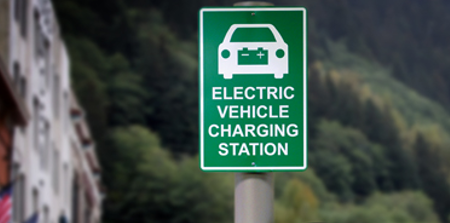President Biden, U.S. DOT Releases Toolkit to Help Rural Communities Build Out Electric Vehicle Charging Infrastructure
Bipartisan Infrastructure Law to Provide $7.5 Billion for EV Charging Network Across America
The U.S. Department of Transportation released a new, free resource to help rural communities across the country take full advantage of federal funding for electric vehicle (EV) charging stations. The guide, titled Charging Forward: A Toolkit for Planning and Funding Rural Electric Mobility Infrastructure, can help connect community members, towns, businesses, planning agencies, and others with partners needed for these projects. President Biden’s Bipartisan Infrastructure Law includes a total of $7.5 billion to build out a nationwide network of 500,000 electric vehicle chargers.
The toolkit contains best practices for planning EV charging networks and tips to navigate federal funding and financing to help make these projects a reality. DOT will also be holding workshops with rural communities to utilize the toolkit most effectively.
This toolkit is being released in anticipation of the distribution of $7 billion in funds to accelerate the deployment of a national electric vehicle charging network from the President’s Bipartisan Infrastructure Law. Of these funds, $4.75 billion will be distributed by formula to states, and an additional $2.5 billion will be distributed through a competitive grant program that will support innovative approaches and ensure that charger deployment meets Administration priorities such as supporting rural charging, improving local air quality and increasing EV charging access in disadvantaged communities. Together, this is the largest-ever U.S. investment in EV charging and will be a transformative down payment on the transition to a zero-emission future.
“Drivers in rural areas often have the longest commutes and spend the most money on gas, which means big benefits from having access to electric cars and pickup trucks if they are affordable and easy to charge where they live and drive,” said Secretary Pete Buttigieg. “The investments in the President’s Bipartisan Infrastructure Law for a national EV charging network are an important step toward ensuring that EVs aren’t a luxury item and that everyone in America can benefit from clean transportation.”
The Department of Transportation, along with the Department of Energy and the White House are conducting outreach and providing resources including this new toolkit to help ensure all Americans, including those in rural, disadvantaged, and hard-to-reach locations, benefit from EV technology.
This toolkit follows other examples of recent progress towards expansion of EV infrastructure including a memorandum of understanding signed by Secretary Buttigieg and U.S. Secretary of Energy Jennifer M. Granholm, which sets the stage for the two agencies to collaborate on implementation of the Bipartisan Infrastructure Law’s electric vehicle provisions.
Further, today’s announcement follows progress on the Biden-Harris Administration delivering the benefits of the Bipartisan Infrastructure Law to rural communities. Last week, DOT announced more than $1.2 billion for the Appalachian Development Highway System. Yesterday, the Department of Interior announced $1.15 billion to help 26 states cap and remediate orphan oil and gas wells that will help many rural areas. Last month, DOT also announced a historic investment in bridges, including off system bridges that greatly benefit rural communities
The toolkit was developed as part of the Rural Opportunities to Use Transportation for Economic Success (ROUTES) Initiative at USDOT, which coordinates rural infrastructure policy at the Department. The ROUTES Initiative was first created in 2019 and codified in the Bipartisan Infrastructure Law. ROUTES provides technical assistance and easy-to-access resources for rural transportation stakeholders, including this toolkit. More information on the ROUTES Initiative can be found at www.transportation.gov/rural.
The Department will also host a webinar to present the toolkit in more detail on February 9 at 1:30 PM ET. The webinar is free to attend, register here.
Over the coming weeks and months, USDOT will hold additional workshops with rural communities and stakeholders to obtain feedback on the toolkit and provide information to help rural communities get started with electric vehicle charging projects. An updated toolkit will be available this summer that incorporates feedback from these workshops, expanded information on new programs, and new information on topics such as transit and school bus electrification.
Updates on the revised toolkit and other rural EV resources will be provided at www.transportation.gov/rural/ev.
The toolkit is available here: www.transportation.gov/rural/ev/toolkit
Category: Driver Stuff, Electric Vehicles, Equipment, Featured, Fuel & Oil, General Update, Green, News, Shop Stuff, Tech Talk, Tools











